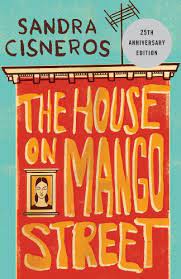
Although they are technically vignettes, the short chapters in Sandra Cisneros’ The House on Mango Street are deeply poetic in their use of figurative language. And why wouldn’t they be? Cisneros herself is a poet as well as a prose writer who has a solid collection of poems to her credit.
My teaching history includes a long stretch of years teaching Mango Street. During that time, I invited my students to write as well as read. In fact, they named their short collections after their own homes’ street names and selected a number of prompts below for inspiration. Once the prompts were selected, students reread the Cisneros vignette that inspired the writing prompt, pointed out to their groups (or the class) their favorite lines (often writing techniques, which they then identified), then used the vignettes as a model to write their own.
The result? A greater appreciation of Cisneros’ style and no small amount of pride among student-writers once their little books of five vignettes (though teachers can pick any number) were written, critiqued, revised, published, and shared not only with the class but with their own families and friends.
“The House on Mango Street” (p. 1)
Describe your house in detail. Include the sounds and smells typical of your home, and perhaps how certain structures/objects feel in it or outside of it. Use figurative language to describe a few of its features (windows, doors, etc.). Finally, embed one brief anecdote in your description that shows something about your house (like the nun anecdote in Cisneros’ vignette).
“Hairs” (p. 6)
Use personification and/or a series of similes/metaphors to describe your hair and the hair of other members of your family. Make sure your figurative language is both original and accurate.
“Boys & Girls” (p. 8)
How are boys and girls different socially? In what ways do they “live in separate worlds,” in your opinion? Bring to life a brief example.
“My Name” (p. 10)
What does your name mean? How did you get it? Do you like it? Why or why not? Do you have a nickname? What would you name yourself? Why? Any stories associated with how you got your name?
“Cathy, Queen of Cats” (p. 12)
Describe in detail a neighbor who is special in some way OR a friend you had when you were younger. Tell what the person looked like and, using dialogue and actions, show what made that person unique.
“Our Good Day” (p. 14)
Choose a “good day” from your childhood or more recent days where you and some friends had an “adventure.” Zoom in to the highlight of this day (the best part) and tell the story of what happened. Be sure to embed important descriptions of the characters involved, the setting, and dialogue. Use a few original similes/metaphors as well.
“Laughter” (p. 17)
Write a vignette describing what your laughter is like. Pick a few friends’ or family members’ laughs to describe with figurative language, too. How are they all similar or different?
“Gil’s Furniture Bought & Sold” (p. 19)
Choose a place that’s cluttered and describe it using specific nouns and figurative language. It could be a store like Gil’s, a room, a garage, a closet, a basement, or an attic.
“Meme Ortiz” (p. 21)
Describe a person who owns a cat or dog (or other pet). How are the person and pet alike? How are they different? Compare and contrast; include an anecdote about the person and pet.
“Louie, His Cousin & His Other Cousin” (p. 23)
Either describe a favorite car (old car, cool car, junk car) in your family OR tell the story of a fender bender or any other car-related incident you’ve been in or witnessed.
“Marin” (p. 26)
Describe someone who has great dreams. Be sure the reader can see both the character AND his or her great dreams.
“Those Who Don’t” (p. 28)
Are you afraid of cities or certain other locations? Of people in some way different from you? Why? Tell a story of an encounter with people you felt uncomfortable around. How did you behave and, in retrospect, how did this make you feel? Did you overcome your fear? Share details on how.
“There Was An Old Woman…” (p. 29)
Were there ever kids who your parents warned you to stay away from? Describe a few of them and, briefly, how they looked, spoke, and behaved.
“Alicia Who Sees Mice” (p. 31)
Share a story that illustrates one of your fears or, if you prefer, one of someone you know.
“Darius & the Clouds” (p. 33)
Describe a time when someone surprised you by saying something enlightening, revealing, or just plain cool.
“And Some More” (p. 35)
Tell an anecdote (using dialogue, actions, description) of a time when you and some friends got in an argument over something stupid.
“The Family of Little Feet” (p. 39)
Can you recall a time when you played dress up or did something that made you feel much older and more sophisticated? Show (vs. just tell) the story.
“A Rice Sandwich” (p. 43)
Bag lunches and school cafeterias. Describe in detail some unique sandwiches and designs, some interesting foods and surprises, you’ve found in your brown bags/lunch boxes or pouches at school lunch. Ever trade foods? Which ones and why? Do you have any funny cafeteria stories? Share your story using showing details, figurative language, and sensory details.
“Chanclas” (p. 46)
Describe a time when you were mortified by having to wear clothing you considered to be ugly, inappropriate, or embarrassing. Where were you and why did you feel this way? What happened?
“Hips” (p. 49)
Create some jump-rope rhymes (or “Choosing It” rhymes) of your own. Share a few actual ones (like Nenny does) that you used when you were a kid.
“The First Job” (p. 53)
Describe a situation when you were shy almost to the point of self-conscious embarrassment.
“Papa Who Wakes” (p. 56)
Has there ever been a death in the family? Describe your emotions. How did you deal with the pain or help others deal with it? How did others help you? What did you gain from the experience?
“Born Bad” (p. 58)
Have you ever picked on someone only to be torn by guilt for doing it? Describe the incident and the feelings it caused.
“Elenita, Cards, Palm, Water” (p. 62)
Describe a memory involving a superstition, astrology, or fortune telling.
“Geraldo No Last Name” (p. 65)
Has an interesting stranger ever passed in and out of your life in one day? Provide details.
“Edna’s Ruthie” (p. 67)
Describe an adult who behaves like a kid. Show the reader how this person acts and remains young.
“The Earl of Tennessee” (p. 70)
Read the quote on p. 71 that begins and ends with the following words: “At night Nenny and I can hear… lets loose its sigh of dampness.” Using the sense of sound only, describe a daily ritual someone goes through at home or elsewhere that you can recognize by listening from another room.
“Sire” (p. 72)
Describe a time when you had to force yourself to be brave around people who made you nervous.
“Four Skinny Trees” (p. 74)
Use personification and simile/metaphor to describe an inanimate object.
“No Speak English” (p. 76)
Have you ever met someone who could not speak English or been in a country where you could not speak the native language? Share your experience with a brief anecdote.
“Rafaela Who Drinks…” (p. 79)
Rafaela wishes she were Rapunzel. Describe a fairy tale character or a mythological character you wish YOU were. Explain.
“Sally” (p. 81)
Write a monologue to a person (real or imagined) you have frequently seen but never met. What do you already know about this person? What speculations do you have about him/her? What would you ask him/her? Add a description of the person.
“Minerva Writes Poems” (p. 84)
Write a letter of advice to Minerva. Include an original poem of your own about something cheerful.
“Bums in the Attic” (p. 86)
Who (or what) might you invite to sleep in your attic? Why?
“Beautiful & Cruel” (p. 88)
Write about ways you have tried to show your independence by doing things your own way.
“A Smart Cookie” (p. 90)
What lesson about life has YOUR mother or father tried to share with you? Bring the reader there through dialogue and description.
“What Sally Said” (p. 92)
Detail a time when you or your family had to help someone in trouble. Use the key moments only.
“The Monkey Garden” (p. 94)
Describe in detail a garden or other secret spot you visited or hid in (or still go to now) as a kid.
“Red Clowns” (p. 99)
Use description and imagery to make an otherwise common location seem scary.
“Linoleum Roses” (p. 101)
Tell a brief story that uses irony to make a point.
“The Three Sisters” (p. 103)
Share a story where the supernatural plays an important role.
“Alicia & I Talking” (p. 106)
What might your home and your town look like if you returned to it after 20 years away? Describe your return and the surprises it might involve.
“A House of My Own” (p. 108)
Give readers a tour of your dream house – one that reflects your interests as a person. Avoid describing cliché mansions where every detail is provided via endless sums of money. Rather, let even humble details show readers something about YOUR personality and values.
“Mango Says Goodbye Sometimes” (p. 109)
Write a vignette showing how much you care about someone from your present or past. “Rescue them” by bringing their hidden, unknown, or misunderstood story to life for others to see and appreciate.
*****
Enjoying this and other lesson-related posts for the English classroom? Wish you could show your appreciation in a small way?
Go to the BOOKS page and purchase a collection of poems for your classroom library (or yourself). It’s the little gestures that go a long way!









